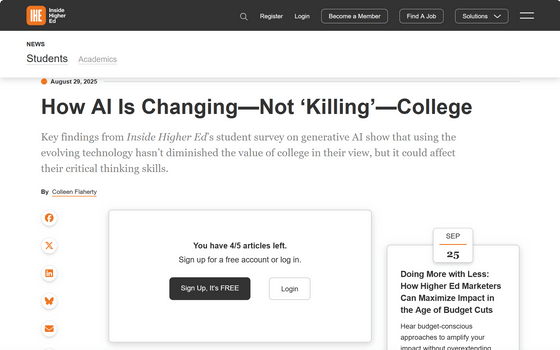55% of college students use generative AI for brainstorming, while 18% question the value of college

A survey of university students about AI found that approximately 85% of them had used generative AI to create assignments. Inside Higher Ed, an education publication, explained the current state of affairs for a generation where generative AI is becoming the norm.
Survey: College Students' Views on AI

The survey received responses from 1,047 students from 166 two- and four-year colleges and universities in the United States.
Approximately 85% of respondents said they had used generative AI in assignments in the past year. The top three reasons for using it were, in order, 'brainstorming ideas' (55%), 'using it as a tutor' (50%), and 'studying for exams/quizzes' (46%). Using it like an advanced search engine also ranked highly (42%).
Most students reported using generative AI primarily as a learning aid, with relatively few reporting using it to complete assignments (25%) or write entire papers (19%).
The majority of students (55%) who used AI in their classes in the past year reported a 'mixed' impact on their learning and critical thinking skills, saying it can sometimes be helpful, but can also impair the depth of thought. 27% said it 'actually had a positive effect.' Fewer students (7%) estimated it to have had a negative effect.

The percentage of students at two-year universities who answered 'I haven't used it in the past year' was 21%, higher than those at four-year universities (14%).
When asked why their classmates were using generative AI in ways that violated academic honor standards, students who knew their classmates were using it in ways that violated academic honor standards cited pressure to get good grades (37%), time constraints (27%), and a lack of concern for academic integrity (26%).
The answers were influenced by various factors, including age. For example, students over 25 were more likely to cite 'lack of time due to work, family, and other obligations, and lack of confidence in their own abilities' as reasons than younger students, while younger students were more likely to say 'classmates don't value standards' and 'I don't feel the content is relevant to me.'
Additionally, about 97% of respondents thought that educational institutions should address the impact of generative AI on academic ethics. However, few people called for a complete ban on its use, with only 18% supporting this.

Regarding teachers' use of generative AI, 29% said they would view it favorably 'as long as it's done thoughtfully and transparently.' 14% were very positive about teachers' use of AI, noting that it would improve the relevance and efficiency of teaching content. 39% of students were somewhat or very unfavorable, expressing concerns about a decline in the quality of teaching and an over-reliance on generative AI. The remaining 15% were neutral.
Additionally, when asked whether generative AI has affected the value of college itself, 35% answered 'no change,' 23% answered 'more valuable than now,' and only 18% answered that it has made them question the value of college. Furthermore, about a quarter of students responded that 'it has changed their perception of the value of college, but they're not sure how specifically.' Inside Higher Ed pointed out, 'In other words, generative AI hasn't caused a sudden drop in the value of college in students' eyes, but it has clearly affected their perception.'
Mark Watkins, vice president for academic innovation at the University of Mississippi, said, 'Integrating AI into academic life requires institutions to properly guide it.' He added, 'Appropriate use cases and frameworks should be made public for all stakeholders, including faculty, staff, and administrators.'
in Posted by log1p_kr